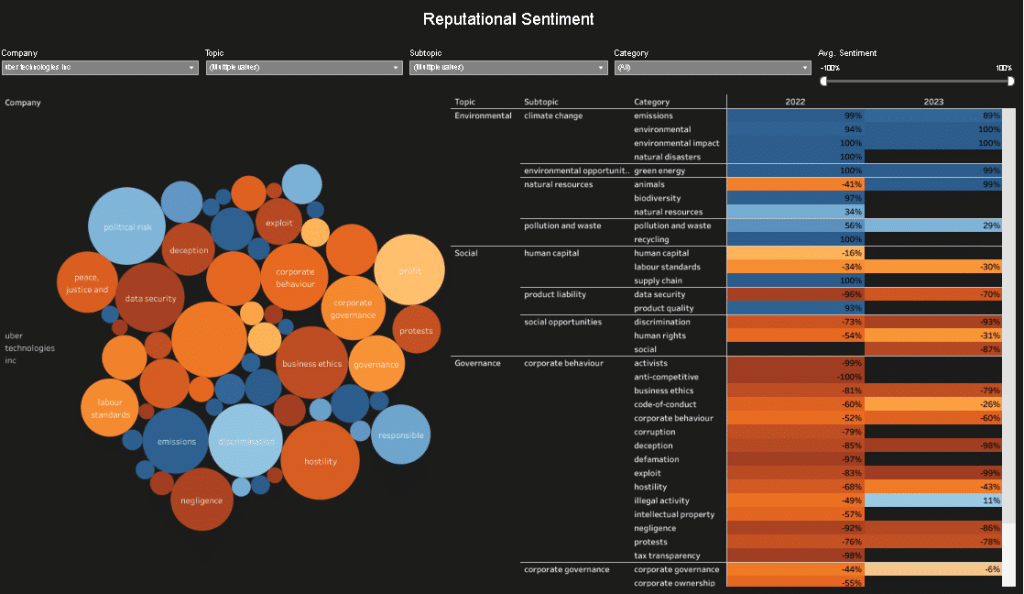Uber, the ride-sharing giant, has gained widespread attention not only for its innovative business model but how committed are they really to sustainability and social responsibility? In this article, we take a deep dive into the Uber ESG score according to our data, decoding what it really means and how it reflects the company’s efforts in these areas.
Understanding ESG scores and their significance
ESG (Environmental, Social, and Governance) is a measure used by investors and stakeholders to evaluate a company’s performance in these key areas. ESG scores have become increasingly important in recent years as consumers and investors demand greater transparency and accountability from businesses. These scores provide a snapshot of how well a company is managing its environmental impact, addressing social issues, and maintaining good governance practices.
When it comes to Uber, its ESG score is a reflection of the company’s commitment to sustainability and social responsibility. It serves as a benchmark for assessing its performance in these areas and provides insights into the initiatives and practices that Uber has implemented to make a positive impact on the world.
Uber ESG score: Exploring its components
Uber’s ESG score is a comprehensive assessment of its performance in the areas of environmental impact, social initiatives, and governance practices. By examining each of these components, we can gain a better understanding of how Uber is addressing sustainability and social responsibility.

Environmental initiatives and commitments by Uber
According to our data, Uber has a score of 86 at time of writing in this area. The company has made significant strides in reducing its environmental footprint driven by one of its key initiatives to transition to electric vehicles (EVs). Uber aims to have 100% of rides in the United States, Canada, and Europe be in EVs by 2030 and globally by 2040. This commitment to electrification not only helps reduce carbon emissions but also promotes the adoption of sustainable transportation options.
In addition to EVs, Uber has also invested in other environmentally friendly initiatives. It has partnered with public transit agencies to promote shared mobility and reduce congestion. Uber has also introduced initiatives like UberPOOL and Uber Bike to encourage the use of shared and sustainable transportation modes. These efforts demonstrate Uber’s commitment to minimizing its environmental impact and promoting sustainable practices.
Social impact programs and community partnerships
The Uber ESG score in social factors, stands at a relatively low 34. This score is reflective of a multitude of factors that have come under scrutiny including:
Labour Disputes and Controversies: Uber has faced persistent criticism and legal challenges related to the treatment of its drivers. Drivers have raised concerns about low pay, the absence of employment benefits, and the perceived unfairness of deactivation practices. These issues have eroded Uber’s reputation and contributed to its low social score.
Driver Classification Issues: The company has been embroiled in lawsuits over its classification of drivers as independent contractors rather than employees. This classification has allowed Uber to avoid providing drivers with benefits such as minimum wage and overtime pay, further damaging its social standing.
Consumer Trust and Safety: A series of safety incidents and concerns about the background checks of drivers have also impacted Uber’s social score. Instances of harassment and safety lapses have led to a loss of trust among passengers and the wider public.
Corporate Culture: Uber’s corporate culture has faced criticism for being toxic and riddled with allegations of discrimination and sexual harassment. Such cultural issues have negatively affected the company’s social reputation and its ability to attract and retain talent.
Transparency and Accountability: Uber has been criticised for a perceived lack of transparency and accountability in its operations. These issues further undermine the company’s social responsibility and its efforts to address its societal impact.
Governance practices and transparency at Uber
Good governance is crucial for any company striving to maintain the highest standards of sustainability and social responsibility however the Uber ESG score in governance is low at 24 according to our data at time of writing. There are a number of reasons for this including:
Leadership Controversies: Uber has grappled with a series of leadership controversies and scandals, most notably in 2017 when the company’s CEO, Travis Kalanick, was compelled to resign. Allegations of sexual harassment, discrimination, and a lack of effective leadership undermined Uber’s corporate governance. The departure of its CEO was a pivotal moment in Uber’s governance challenges.
Lack of Transparency: Uber has been criticised for a perceived lack of transparency in its operations. Concerns have been raised about the company’s disclosure practices, including issues related to data privacy, which have impacted its governance rating.
Corporate Ethics: Allegations of unethical conduct and a toxic corporate culture have eroded trust in Uber’s governance. The company has faced accusations of prioritising aggressive growth over ethical and responsible business practices, which has contributed to its low governance score.
Regulatory Battles: Uber has been embroiled in regulatory battles in many regions, often stemming from its disruptive business model and labour classification issues. These battles have raised questions about Uber’s willingness to work within the regulatory framework and have negatively affected its governance standing.
Board Composition: Concerns about the composition of Uber’s board of directors and its independence have also played a role in the company’s low governance score. Questions have been raised about the board’s ability to effectively oversee the company’s actions and decisions.

Uber ESG score: Assessing the strengths and weaknesses
While Uber has made significant progress in sustainability there is still plenty of work to be down within the remit of social responsibility and governance.
With that said, Uber can embark on a strategic journey to bolster its ESG score by focusing on key initiatives. Firstly, in the realm of environmental responsibility, Uber can expedite its transition to a greener fleet by accelerating its efforts to electrify vehicles and reduce carbon emissions. By achieving its goals in this domain, the company can demonstrate a tangible commitment to mitigating the environmental impacts of its operations, which would have a positive influence on its ESG rating.
Simultaneously, Uber can make significant strides in social responsibility by enhancing its relationships with drivers. Improving pay structures, benefits, and safety measures can foster a more positive working environment, while also bolstering the company’s reputation in the eyes of both drivers and passengers. Furthermore, implementing measures to combat discrimination and harassment and promoting diversity and inclusion can contribute to a healthier corporate culture. Lastly, Uber can make a substantial contribution to the communities it serves by actively engaging with local stakeholders, addressing community concerns, and supporting social initiatives, thereby strengthening its social credentials. Such strategic efforts will collectively contribute to an improved ESG score and position Uber as a socially and environmentally responsible corporate citizen.
The future of sustainability and social responsibility in the ride-sharing industry
As the ride-sharing industry continues to evolve, sustainability and social responsibility will play an increasingly significant role among players like Uber and their main competitor Lyft. Consumers are becoming more conscious of their choices, and they expect businesses to prioritize environmental and social considerations. This shift in consumer behaviour will likely drive industry-wide changes, pushing companies to adopt more sustainable practices and contribute positively to society.
Uber, with its focus on sustainability is well-positioned to thrive in this changing landscape but needs to the work in social and governance factors. By continually innovating and investing in initiatives that address environmental and social challenges, Uber can set the standard for the ride-sharing industry and inspire others to follow suit.
The role of ESG scores in driving positive change in businesses
The Uber ESG score serves as a testament to the company’s commitment to sustainability and social responsibility. By decoding this score and examining its components, we have gained insights into Uber’s environmental initiatives, social impact, and governance practices. While there are areas where Uber can improve, its efforts to reduce carbon emissions and provide safer transportation options are commendable.
ESG scores play a vital role in driving positive change in businesses. They provide a framework for evaluating a company’s performance in key areas and encourage transparency and accountability. As consumers and investors continue to prioritize sustainability and social responsibility, ESG scores will become increasingly important in shaping the business landscape as well as corporate decision making.
Find out more
If you’re eager to delve deeper into granular ESG data on Uber, don’t hesitate to get in touch with us. Simply drop us an email at enquiries@permutable.ai or complete the contact form below. We’re here to provide you with the insights you need to make informed decisions and drive positive change. Reach out today.
